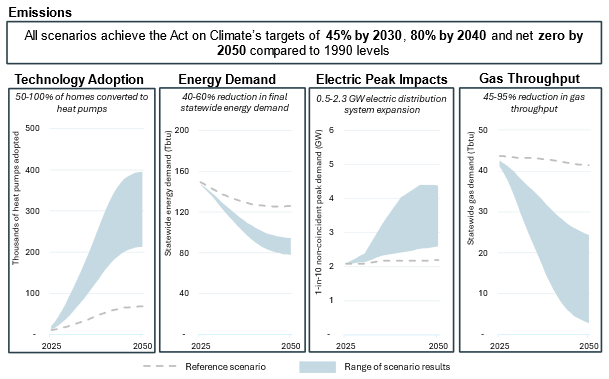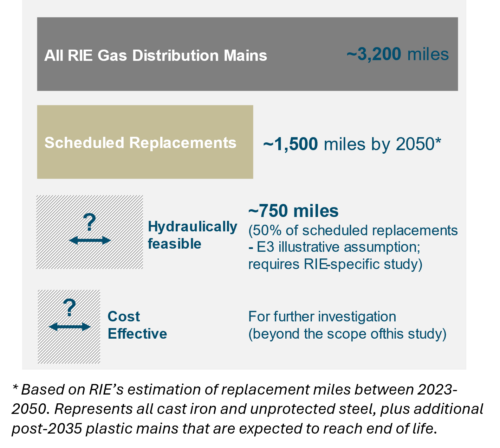
Rhode Island’s Act on Climate requires the state to reduce its greenhouse gas (GHG) emissions by 45% by 2030, 80% by 2040, and net-zero by 2050, compared to 1990 levels. In the context of this climate commitment, on June 9, 2022, the Rhode Island Public Utilities Commission (PUC) opened Docket 22-01-NG (“the Docket”) to investigate the effect of the Act on Climate (“the Act”) on the regulated gas distribution business in Rhode Island. After the PUC opened the Docket, Rhode Island Energy (RIE) retained E3 to develop a Technical Analysis Report to support the Stakeholder Committee established by the PUC. The Technical Analysis Report, which E3 released this month, investigates pathways for the gas system to reduce emissions and examines the implications of these pathways.
To create the Technical Analysis Report, E3 designed six economy-wide decarbonization scenarios. During the design of the scenarios, E3 consulted with the Stakeholder Committee led by Apex Analytics as well as a Technical Working Group comprised of subject matter experts, receiving final direction and approval from the PUC. The final scenarios each present distinct pathways to achieving the Act’s climate targets. The scenarios primarily differ in the transition of the heating sector. Each explores varying levels of electrification, hybrid heating solutions, networked geothermal systems, and the continued use of the gas distribution system through supply of renewable gases.
The Technical Analysis Report shows that each scenario requires significant transformation of the heating sector in Rhode Island. Under each scenario, this transformation presents implications for statewide energy use, the gas system, and its customers. In all scenarios, energy efficiency and building electrification are critical components of gas system decarbonization; between 50-100% of buildings are assumed to electrify across scenarios to comply with the Act’s targets. While final, total energy demand in the state decreases between 40-60% by 2050 through these measures, Rhode Island will see an increased demand for renewable electricity and renewable fuels. In addition, the adoption of heat pumps and electric vehicles (EVs) will require significant electric system expansion in the state while gas throughput declines in all scenarios.

Role and use of the gas system
With regard to the role and use of the gas system, the Technical Analysis finds that:
- The utilization of the gas system is expected to decline significantly across scenarios, with gas throughput falling between 45-90% as a result of efficiency and conversions to electric heating.
- Costs of the gas system are expected to rise as a result of planned levels of capital expenditures through the Infrastructure, Safety and Reliability (ISR) program.
- Combining reduced throughput with increasing system costs under the current regulatory framework results in rapidly escalating delivery rates for residential, commercial and industrial customers in nearly all decarbonization scenarios, leading to untenable long-term gas delivery rates for scenarios with high levels of customer departures.
- Today, because of high electricity rates in the state, gas customers transitioning to efficient electric heating will experience an approximately 25% increase in monthly energy bills. The higher costs of electrification relative to natural gas imply that Rhode Island needs additional programmatic and policy support to achieve the levels of customer electrification modeled to meet the requirements of the Act.
- At the same time, electric heating becomes more cost-effective over time in comparison to gas heating in all scenarios. This outcome occurs because gas rate increases outpace electric rate increases as a result of two dynamics: 1) in scenarios where customers transition away from the gas system, the costs of the system are shifted to fewer remaining gas customers, and 2) in scenarios where customers remain connected to the gas system, the commodity cost of gas increases through the procurement of renewable fuels.
Impacts of a managed transition
As suggested by the Stakeholder Committee, E3 explored the impact of a managed transition. Under a managed transition, electrification projects occur in a targeted, neighborhood-scale manner, assuming these projects could avoid gas system reinvestment costs. Through an illustrative analysis, E3 estimated that if RIE could avoid up to 50% of capital replacements through targeted electrification, annual costs of the system could be reduced by up to 35% by 2050, while reducing potentially unrecovered rate base to $1.5 billion. Although a managed transition could avoid annual system costs, its impact is relatively small on delivery rates in scenarios with high levels of electrification. However, the level of reinvestment avoidance assumed in this analysis is unprecedented, and much more research is required to understand the technical feasibility of this approach.

Significant stakeholder input
The Technical Analysis Report was developed with significant input from stakeholders. E3 worked closely together with the Stakeholder Committee, formed by the PUC and led by Apex Analytics, to develop and iterate on the scope of the scenario analysis. Through monthly meetings, E3 proposed scenario designs and modeling approaches, incorporated feedback, and presented draft results. In addition, E3 led and facilitated biweekly Technical Working Group (TWG) meetings with a group of subject matter experts who provided critical feedback on the assumptions and methodology underlying this study. The TWG helped validate critical scenario input, provided alternative modeling methodologies, and proposed modeling assumptions and sources where needed.
Next steps in the process
The Technical Analysis Report summarizes implications of scenarios across multiple evaluation criteria, while distilling key commonalities and outstanding questions for further research. These findings will be used by the Stakeholder Committee and the PUC in the Policy Development phase of the Docket. In this phase, the Stakeholder Committee will outline specific policy and regulatory recommendations for the PUC to consider in the development of next steps regarding the regulated gas distribution business in Rhode Island.
E3’s full analysis, published as part of the docket, is available via the following links:


